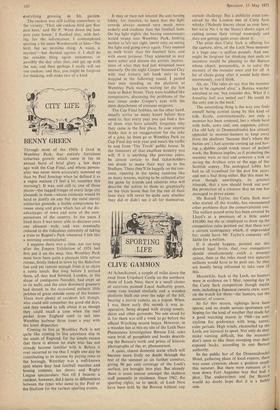CITY LIFE BENNY GREEN
Through most of the 1960s I lived in Wembley Park, that entirely fortuitous suburban growth which came in for its annual burst of brief glory a few days ago with the Cup Final, and whose person- ality was never more accurately summed up than by Paul Jennings when he defined it as a vague malaise ('I feel a bit wembley this morning'). It was, and still is, one of those places—the ragged fringes of every large city abounds in them—whose existence would be hard to justify on any but the most sternly utilitarian grounds, a feeble compromise be- tween smog and grass which has all the dis- advantages of town and none of the com- pensations of the country. In the years lived there I was never able to discover even one pleasant walk, and was eventually reduced to the ridiculous extremity of taking a train to Regent's Park whenever I felt like a morning constitutional.
I suppose there was a time, not too long after the Empire Exhibition of 1924 had first put it on the map, that Wembley Park must have been quite a pleasant little sylvan retreat, firmly linked to town by the Bakerloo line and yet remote enough from it to claim a rustic touch. But long before I arrived there, all that had finished. London, in the shape of contiguous Neasden, had crept up to its walls, and the once dominant greenery had shrunk to the occasional pathetic little patches of grass outside some of the houses. There were plenty of residents left though, who could still remember the good old days, and they tended to talk about it as though they could recall a time when the mail packet from England used to sail into Wembley harbour three times a year with the latest dispatches.
Coming to live at Wembley Park is not quite like coming to live anywhere else in the south of England, for the simple reason that there is almost no male who has not already become familiar with it. Before it ever occurred to me that I might one day be contributing to its income by paying rates to the borough, Wembley was a well-known spot where they had football matches and boxing contests, ice shows and Rugby League spectaculars. Not till I became a resident, however, did .I learn to differentiate between the types who came to the Pool or the Stadium for the various sporting events,, It may or may not interest the anti-boxing lobby, for instance, to learn that the fight crowds always seemed very much more orderly and studious than the football fans. On big fight nights, the boxing connoisseurs would sweep into Wembley Park, looking neither to left nor right, intent only on seeing the fight and going away again. They seemed to walk faster than the football fans, and with more purpose. They appeared to stay more sober and discuss the artistic implica- tions of what they had just witnessed more intensely. On the night Cooper bounced Clay with that historic left hook only to be stopped in the following round, I passed four men standing on the platform at Wembley Park station waiting for the fast train to Baker Street. They were huddled like conspirators, discussing the problems of the scar tissue under Cooper's eyes with the stern detachment of eminent surgeons.
The Cup Final bobbies, on the other hand, usually arrive so many hours before they need to, that every year you can find a few of them who have actually forgotten why they came in the first place. In case anyone thinks this is an exaggeration for the sake of a joke, let them go to Wembley Park on Cup Final day next year and watch the traffic to and from 'The Torch' public house. In the forecourt of that excellent hostelry you will, if it is anything like previous years, be almost certain to find ticket-holders too drunk to make their way up to the Stadium. There they'll lie happily on the con- crete, ripening in the spring sunshine like so many lemons, waiting to be collected after the game by friends and relatives who will describe the action to them so graphically on the train home that for the rest of their lives they will never be quite sure whether they did or didn't see it all for themselves.






































 Previous page
Previous page